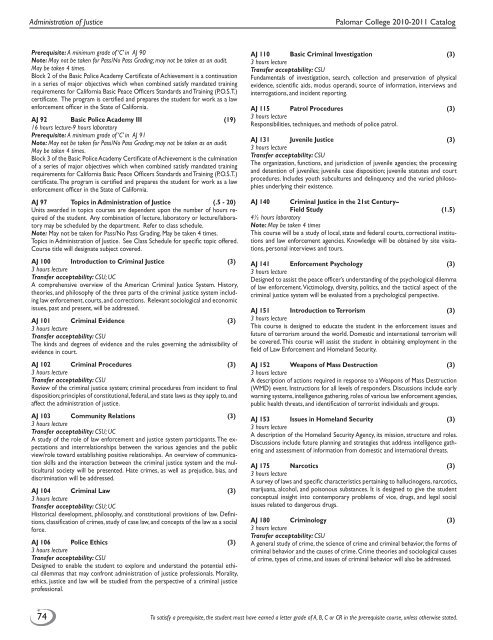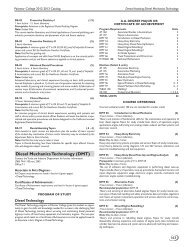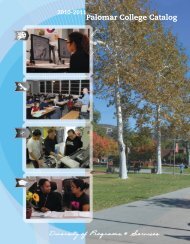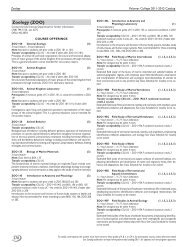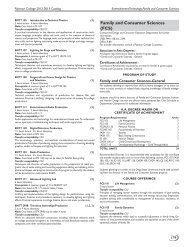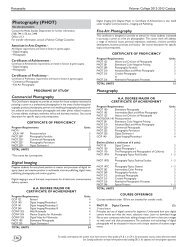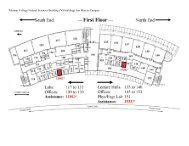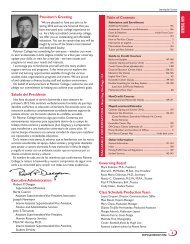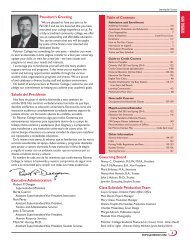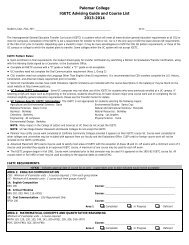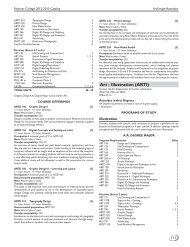Download the complete catalog - Palomar College
Download the complete catalog - Palomar College
Download the complete catalog - Palomar College
You also want an ePaper? Increase the reach of your titles
YUMPU automatically turns print PDFs into web optimized ePapers that Google loves.
Administration of Justice<br />
<strong>Palomar</strong> <strong>College</strong> 2010-2011 Catalog<br />
Prerequisite: A minimum grade of ‘C’ in AJ 90<br />
Note: May not be taken for Pass/No Pass Grading; may not be taken as an audit.<br />
May be taken 4 times.<br />
Block 2 of <strong>the</strong> Basic Police Academy Certificate of Achievement is a continuation<br />
in a series of major objectives which when combined satisfy mandated training<br />
requirements for California Basic Peace Officers Standards and Training (P.O.S.T.)<br />
certificate. The program is certified and prepares <strong>the</strong> student for work as a law<br />
enforcement officer in <strong>the</strong> State of California.<br />
AJ 92 Basic Police Academy III (19)<br />
16 hours lecture-9 hours laboratory<br />
Prerequisite: A minimum grade of ‘C’ in AJ 91<br />
Note: May not be taken for Pass/No Pass Grading; may not be taken as an audit.<br />
May be taken 4 times.<br />
Block 3 of <strong>the</strong> Basic Police Academy Certificate of Achievement is <strong>the</strong> culmination<br />
of a series of major objectives which when combined satisfy mandated training<br />
requirements for California Basic Peace Officers Standards and Training (P.O.S.T.)<br />
certificate. The program is certified and prepares <strong>the</strong> student for work as a law<br />
enforcement officer in <strong>the</strong> State of California.<br />
AJ 97 Topics in Administration of Justice (.5 - 20)<br />
Units awarded in topics courses are dependent upon <strong>the</strong> number of hours required<br />
of <strong>the</strong> student. Any combination of lecture, laboratory or lecture/laboratory<br />
may be scheduled by <strong>the</strong> department. Refer to class schedule.<br />
Note: May not be taken for Pass/No Pass Grading. May be taken 4 times.<br />
Topics in Administration of Justice. See Class Schedule for specific topic offered.<br />
Course title will designate subject covered.<br />
AJ 100 Introduction to Criminal Justice (3)<br />
3 hours lecture<br />
Transfer acceptability: CSU; UC<br />
A comprehensive overview of <strong>the</strong> American Criminal Justice System. History,<br />
<strong>the</strong>ories, and philosophy of <strong>the</strong> three parts of <strong>the</strong> criminal justice system including<br />
law enforcement, courts, and corrections. Relevant sociological and economic<br />
issues, past and present, will be addressed.<br />
AJ 101 Criminal Evidence (3)<br />
3 hours lecture<br />
Transfer acceptability: CSU<br />
The kinds and degrees of evidence and <strong>the</strong> rules governing <strong>the</strong> admissibility of<br />
evidence in court.<br />
AJ 102 Criminal Procedures (3)<br />
3 hours lecture<br />
Transfer acceptability: CSU<br />
Review of <strong>the</strong> criminal justice system; criminal procedures from incident to final<br />
disposition; principles of constitutional, federal, and state laws as <strong>the</strong>y apply to, and<br />
affect <strong>the</strong> administration of justice.<br />
AJ 103 Community Relations (3)<br />
3 hours lecture<br />
Transfer acceptability: CSU; UC<br />
A study of <strong>the</strong> role of law enforcement and justice system participants. The expectations<br />
and interrelationships between <strong>the</strong> various agencies and <strong>the</strong> public<br />
view/role toward establishing positive relationships. An overview of communication<br />
skills and <strong>the</strong> interaction between <strong>the</strong> criminal justice system and <strong>the</strong> multicultural<br />
society will be presented. Hate crimes, as well as prejudice, bias, and<br />
discrimination will be addressed.<br />
AJ 104 Criminal Law (3)<br />
3 hours lecture<br />
Transfer acceptability: CSU; UC<br />
Historical development, philosophy, and constitutional provisions of law. Definitions,<br />
classification of crimes, study of case law, and concepts of <strong>the</strong> law as a social<br />
force.<br />
AJ 106 Police Ethics (3)<br />
3 hours lecture<br />
Transfer acceptability: CSU<br />
Designed to enable <strong>the</strong> student to explore and understand <strong>the</strong> potential ethical<br />
dilemmas that may confront administration of justice professionals. Morality,<br />
ethics, justice and law will be studied from <strong>the</strong> perspective of a criminal justice<br />
professional.<br />
AJ 110 Basic Criminal Investigation (3)<br />
3 hours lecture<br />
Transfer acceptability: CSU<br />
Fundamentals of investigation, search, collection and preservation of physical<br />
evidence, scientific aids, modus operandi, source of information, interviews and<br />
interrogations, and incident reporting.<br />
AJ 115 Patrol Procedures (3)<br />
3 hours lecture<br />
Responsibilities, techniques, and methods of police patrol.<br />
AJ 131 Juvenile Justice (3)<br />
3 hours lecture<br />
Transfer acceptability: CSU<br />
The organization, functions, and jurisdiction of juvenile agencies; <strong>the</strong> processing<br />
and detention of juveniles; juvenile case disposition; juvenile statutes and court<br />
procedures. Includes youth subcultures and delinquency and <strong>the</strong> varied philosophies<br />
underlying <strong>the</strong>ir existence.<br />
AJ 140 Criminal Justice in <strong>the</strong> 21st Century–<br />
Field Study (1.5)<br />
4½ hours laboratory<br />
Note: May be taken 4 times<br />
This course will be a study of local, state and federal courts, correctional institutions<br />
and law enforcement agencies. Knowledge will be obtained by site visitations,<br />
personal interviews and tours.<br />
AJ 141 Enforcement Psychology (3)<br />
3 hours lecture<br />
Designed to assist <strong>the</strong> peace officer’s understanding of <strong>the</strong> psychological dilemma<br />
of law enforcement. Victimology, diversity, politics, and <strong>the</strong> tactical aspect of <strong>the</strong><br />
criminal justice system will be evaluated from a psychological perspective.<br />
AJ 151 Introduction to Terrorism (3)<br />
3 hours lecture<br />
This course is designed to educate <strong>the</strong> student in <strong>the</strong> enforcement issues and<br />
future of terrorism around <strong>the</strong> world. Domestic and international terrorism will<br />
be covered. This course will assist <strong>the</strong> student in obtaining employment in <strong>the</strong><br />
field of Law Enforcement and Homeland Security.<br />
AJ 152 Weapons of Mass Destruction (3)<br />
3 hours lecture<br />
A description of actions required in response to a Weapons of Mass Destruction<br />
(WMD) event. Instructions for all levels of responders. Discussions include early<br />
warning systems, intelligence ga<strong>the</strong>ring, roles of various law enforcement agencies,<br />
public health threats, and identification of terrorist individuals and groups.<br />
AJ 153 Issues in Homeland Security (3)<br />
3 hours lecture<br />
A description of <strong>the</strong> Homeland Security Agency, its mission, structure and roles.<br />
Discussions include future planning and strategies that address intelligence ga<strong>the</strong>ring<br />
and assessment of information from domestic and international threats.<br />
AJ 175 Narcotics (3)<br />
3 hours lecture<br />
A survey of laws and specific characteristics pertaining to hallucinogens, narcotics,<br />
marijuana, alcohol, and poisonous substances. It is designed to give <strong>the</strong> student<br />
conceptual insight into contemporary problems of vice, drugs, and legal social<br />
issues related to dangerous drugs.<br />
AJ 180 Criminology (3)<br />
3 hours lecture<br />
Transfer acceptability: CSU<br />
A general study of crime, <strong>the</strong> science of crime and criminal behavior, <strong>the</strong> forms of<br />
criminal behavior and <strong>the</strong> causes of crime. Crime <strong>the</strong>ories and sociological causes<br />
of crime, types of crime, and issues of criminal behavior will also be addressed.<br />
74 To satisfy a prerequisite, <strong>the</strong> student must have earned a letter grade of A, B, C or CR in <strong>the</strong> prerequisite course, unless o<strong>the</strong>rwise stated.


